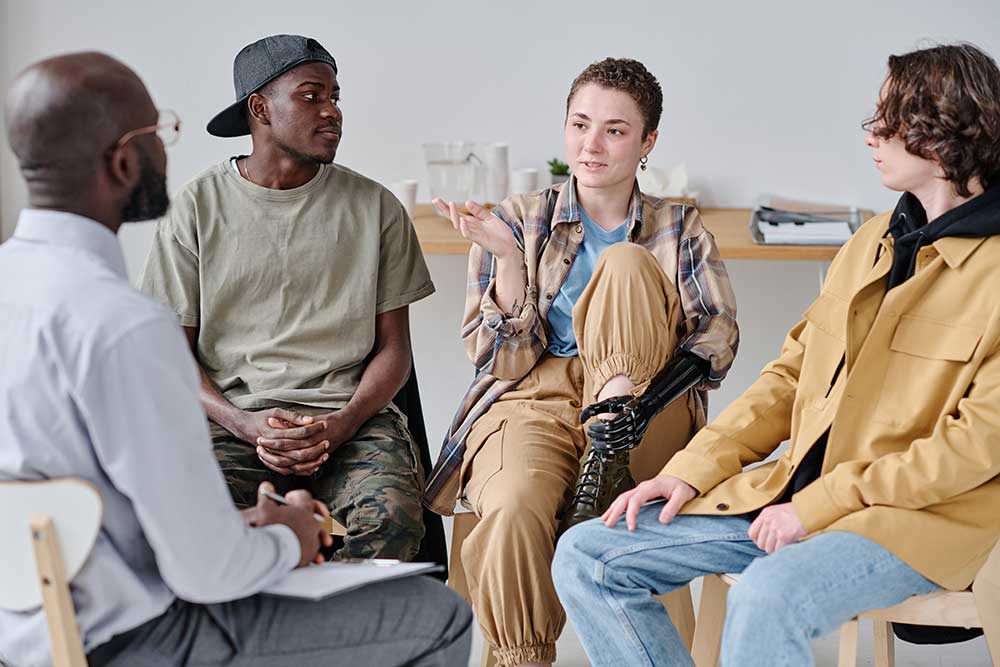Addiction Therapy in Fond du Lac, Wisconsin
At our rehab in Wisconsin, addiction therapy is essential to our treatment plans. After completing our detox program, individuals can continue treatment in our residential care where they will have access to and attend therapy daily. In addiction therapy, our clients learn coping strategies to overcome their substance abuse and prevent relapse.
If you’re looking for substance abuse treatment in the Midwest, Wisconsin Recovery Institute can be your partner in achieving long-term sobriety. Give us a call today and start your recovery.

Evidence-Based Modalities Used
Individual therapy in addiction treatment relies on various evidence-based modalities that have proven efficacy in addressing the complex nature of substance use disorders. Here are some key modalities used in individual therapy:
Cognitive-Behavioral Therapy (CBT) is a widely recognized and effective approach that focuses on identifying and modifying distorted thought patterns and behaviors associated with addiction. By challenging and reshaping negative beliefs, individuals learn healthier coping mechanisms and strategies to manage cravings and triggers.
MI is a person-centered counseling approach that explores and strengthens an individual’s intrinsic motivation to change. Therapists using MI work collaboratively with clients to evoke and reinforce their reasons for pursuing recovery. This approach is particularly effective in enhancing an individual’s commitment to change.
Originally developed for individuals with borderline personality disorder, dialectical behavior therapy (DBT) has proven beneficial in addiction treatment. It combines cognitive-behavioral techniques with mindfulness strategies, emphasizing the development of skills for emotional regulation, interpersonal effectiveness, distress tolerance, and acceptance.
Mindfulness-based therapies, such as Mindfulness-Based Relapse Prevention (MBRP), incorporate mindfulness and meditation practices. These techniques help individuals develop awareness of their thoughts and emotions, promoting a non-judgmental acceptance of the present moment and reducing the risk of relapse.
Many individuals with substance use disorders have a history of trauma. Trauma-informed therapy recognizes the impact of trauma on mental health and addiction, integrating trauma-sensitive approaches to help individuals process and heal from past traumatic experiences.
Psychodynamic therapy explores unconscious processes and unresolved conflicts that may contribute to addictive behaviors. By gaining insight into underlying issues, individuals can better understand and address the root causes of their addiction.

Benefits of Individual Therapy
Individual therapy, also known as one-on-one counseling or psychotherapy, offers a range of benefits for individuals seeking support for various concerns, including substance use disorders. Here are some key advantages:
Tailored sessions focused on individual needs.
Safe space for open and honest communication.
In-depth examination of past experiences and traumas.
Collaborative goal-setting for measurable progress.
Adaptable approach to evolving needs.
Empathetic guidance and validation of experiences.
Targeted examination and management of specific triggers.
Practical strategies to manage cravings and stress.
Deepened understanding of oneself and behavior patterns.
Encouragement of active participation in the recovery journey.
GROUP THERAPY FOR ADDICTION IN WISCONSIN
What to Expect in Group Therapy
In group therapy, individuals grappling with substance use disorders can anticipate a supportive and collaborative environment led by a trained therapist. Within this setting, participants share their experiences, challenges, and triumphs, fostering a sense of connection and mutual understanding. The diverse composition of group members introduces varied perspectives, enriching the therapeutic process. The sessions often incorporate psychoeducation on addiction and relevant coping strategies.
Group therapy encourages open communication, allowing individuals to express themselves freely, while therapeutic techniques such as cognitive-behavioral interventions and role-playing contribute to the overall growth of participants.
Feedback and reflection, coupled with skill-building exercises, enhance personal development and interpersonal skills. The group dynamic establishes a sense of accountability as members set and share goals, and the built-in peer support system creates a safe space for encouragement and shared strategies.
Confidentiality is also a fundamental aspect of group therapy, ensuring that individuals feel secure in sharing their thoughts and experiences within the group setting. Overall, group therapy complements individual therapy, providing a unique and valuable dimension to the comprehensive addiction treatment experience.


Benefits of Group Therapy for Addiction
Group therapy is a great complementary service for addiction treatment. Working toward recovery with peers brings benefits such as:
- Shared Understanding: Participants find comfort and support in sharing experiences with others facing similar challenges.
- Feedback and Reflection: Opportunities for giving and receiving feedback enhance self-awareness, interpersonal skills, and overall development.
- Skill Building: Group sessions often involve skill-building exercises, developing effective communication and coping skills for daily life.
- Accountability: The group dynamic promotes accountability as members set and share goals, creating a motivating environment for positive change.
- Confidential Space: Adherence to confidentiality agreements ensures a safe space for open communication and expression of thoughts and feelings.
- Psychoeducation: Information on addiction, coping strategies, and relapse prevention is provided, enhancing participants’ understanding of their challenges.
- Sense of Community: The group setting fosters a sense of belonging, reducing feelings of isolation and promoting a supportive community among members.
EXPERIENTIAL THERAPY FOR ADDICTION IN WISCONSIN
What is Experiential Therapy?
Experiential therapy is an approach in psychotherapy that involves engaging individuals in various activities and experiences to facilitate emotional processing, self-discovery, and personal growth. Rather than relying solely on traditional talk therapy, experiential therapy encourages participants to actively participate in and reflect on hands-on, interactive exercises.
In the Midwest, where natural landscapes are often abundant, experiential therapy may incorporate outdoor and adventure-based activities to enhance the therapeutic process. Some activities commonly used in experiential therapy in the Midwest include:
- Adventure Therapy: Outdoor activities such as hiking, rock climbing, or ropes courses are utilized to promote teamwork, build trust, and challenge individuals to step outside their comfort zones.
- Art Therapy: Engaging in creative activities, such as painting, sculpting, or other artistic expressions, provides a nonverbal means for individuals to explore and communicate their emotions.
- Nature Walks and Mindfulness: Utilizing the natural surroundings of Wisconsin, activities like nature walks and mindfulness exercises help individuals connect with the environment, fostering a sense of peace and introspection.
- Music and Sound Therapy: Using music, drumming circles, or other sound-based activities, individuals can express emotions and explore self-awareness through auditory experiences.
- Outdoor Group Games: Team-building games and activities conducted outdoors encourage collaboration, communication, and problem-solving skills among group members.
- Yoga and Movement Therapy: Incorporating yoga or other movement-based therapies can help individuals connect their physical and emotional experiences, promoting relaxation and self-awareness.
- Expressive Writing: Engaging in reflective and expressive writing activities allows individuals to process their thoughts and emotions in a structured and therapeutic manner.
How Does Experiential Therapy Help Treat Addiction?
Experiential therapy helps treat addiction by engaging individuals in hands-on, interactive activities that go beyond traditional talk therapy. This approach promotes emotional processing, self-discovery, and personal growth. Through activities such as adventure therapy, equine-assisted therapy, art therapy, and outdoor group games, individuals in addiction treatment can address underlying issues, build coping skills, and develop healthier ways of relating to themselves and others. Experiential therapy provides a dynamic and holistic approach that complements traditional therapeutic methods, contributing to a more comprehensive and effective addiction treatment plan.
Contact Wisconsin Recovery Institute Today!
Embark on your path to lasting recovery by reaching out to Wisconsin Recovery Institute, conveniently located in Fond Du Lac, WI, serving the Midwest. Whether you have questions, seek information, or are ready to take the first step towards a healthier, substance-free life, our dedicated team is here to provide prompt support and guidance.
Contact us via phone or email, and let us assist you with compassion and expertise as you navigate the challenges of addiction. Our residential rehab and detox center prioritizes your comfort, offering individualized treatment plans and a seamless transition from detox to residential treatment.
With therapy options such as individual, group, and experiential therapy, we focus on healing from trauma and building effective coping strategies. Initiate your journey to wellness with a simple reach out – your recovery starts here.

